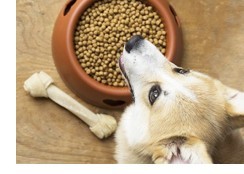
Bloat in dogs is a very serious condition in dogs and can even become deadly. Knowing the signs of bloat is paramount as immediate treatment is vital.
Bloat happens when a dog’s stomach expands due to gas, food and/or fluids. More alarmingly, a dog’s stomach may rotate or twist (aka. Gastric Dilation Volvulus), trapping blood in the stomach which can result in shock. When this happens other organs may be put under pressure, causing lack of blood flow to the heart and stomach lining, a tear in the stomach wall and laboured breathing.
Knowing the Signs
Bloat usually occurs quickly and may start as pain in the stomach. Other signs include:
- Restlessness
- Swollen stomach
- Drooling
- Anxiety
- Pacing
- Dry vomiting
- Looking at the stomach area
The worsening condition may show signs including:
- Collapse
- Pale gums
- Rapid heartbeat
- Weakness
- Laboured breathing
Any of these signs can be cause for alarm. A dog with bloat needs to see a Veterinarian immediately as this condition can become fatal.
What is the cause?
It’s still uncertain the direct cause of bloat in dogs, but risk factors include:
- Eating from a raised food bowl
- Having one large meal daily
- Exercise after eating
- Eating too quickly
- Eating/drinking too much
- Stress
- Inheritance
While any dog can have bloat, it is observed more commonly in deep-chested, large breeds like Akitas, Boxers, Basset Hounds, German Shepherds, Great Danes, Gorgon Setters, Irish Setters, Weimaraners and St. Bernards.
Can it be treated?
Treatment depends on the severity of the condition. If your dog is in shock they may be put on IV fluids, antibiotics or steroids. The most important thing is to release pressure that has built up in the stomach, but this may become problematic if the stomach has twisted. In this case, emergency surgery is required to untwist the stomach to put it back to it’s normal position and keep it from twisting again. It is also vital that we check that no other organs have been damaged during the episode.
Can bloat be prevented?
Bloat is certainly a scary ordeal for pets and owners alike, but there are ways to reduce the chance of it happening to your dog:
- Don’t use raised feeders unless Dr Peter says otherwise
- Don’t let your dog exercise right before or after meals
- Feed several small meals throughout the day instead of one or two larger ones
- Make sure your dog drinks a normal amount of water
Bloat is a scary condition and needs to be treated quickly to ensure the best outcome for your dog. If you notice any of the above signs please contact Pet Doctors 5576 0400 immediately for advice.

